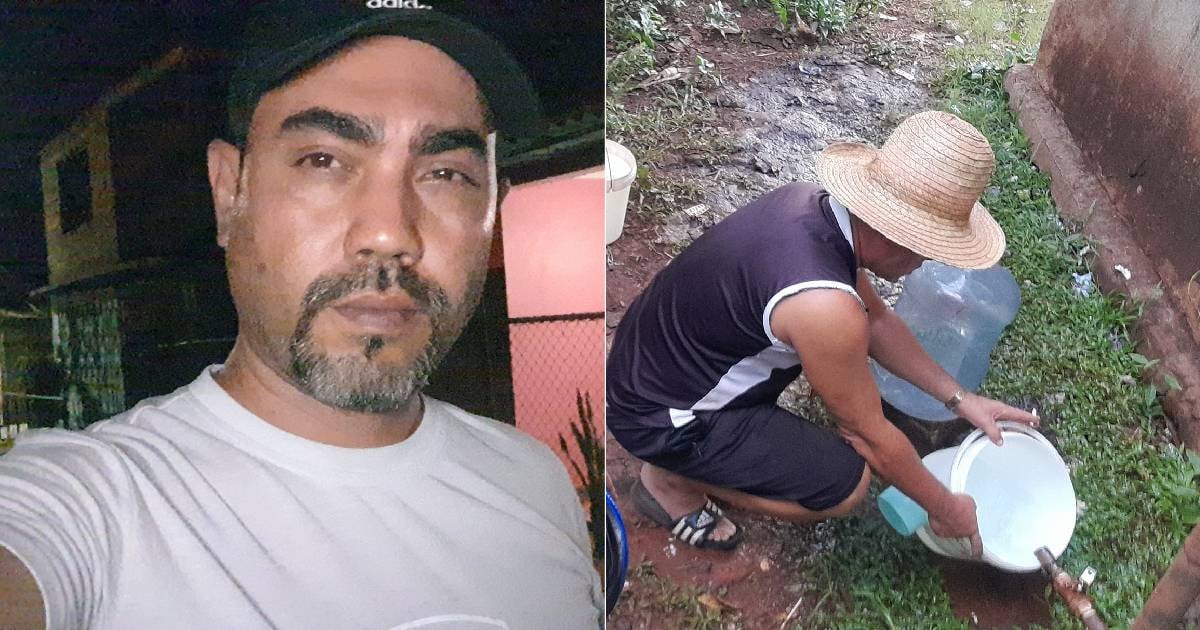
The Holguin activist for human rights, Evert Oscar Matos Leyva, reported the critical situation regarding the water supply that the residents of the Holguin municipality of Moa are suffering.
Evert Oscar, who is the author of the information blog El Caimán Libre, recounted the most recent situation they experienced when “late on Saturday night (11 pm), after more than three weeks without water service, they turned it on in Coloradas Nuevas, coinciding with the omnipresent blackout, and early in the morning, they removed the service.”
This situation caused many residents of the town to be unable to access water, nor could they carry out tasks for which water is essential. One of these was washing, "because washing machines don't work with coal or firewood, but with electricity," the activist ironized.
On Facebook, Evert Oscar took the opportunity to call on the authorities so that due to their "mistakes" we do not see "horrors."
"You, those who misgovern Moa in the name of the totalitarian PCC, are self-sufficient with trucks, and the people know it; we see it daily, and there are graphic testimonies and witnesses of your abusive corruption. So, make the most of what you have left in power, to either indulge more or clean yourselves up by serving the population as what you are: public servants, not masters of what belongs to the people!" he stated.
And he added as a reflection on his part that "this mistreatment of the Moenses is carried out with the full intention of wearing us down more, each day adding crises and diminishing our will and ability to focus. They crush us, and we allow ourselves to be crushed."
The crisis due to the lack of water adds to the one existing on the island due to the shortage of medicine, food, and electricity, pushing the resilience of Cubans to the limit as they turn to social media to show their reality.
This was the case of TikTok user Jesús de Cuba (@jesusdecuba), who from Santiago de Cuba reported that, after seven days without water service, he was forced to go out with a wheelbarrow to a neighbor's house that has a cistern to fill some bottles and have water for personal use.
In the comments on his post, a user pointed out that the peripheral areas of the city are experiencing an even more severe crisis, with longer periods without access to the water supply.
The situation has also extended to traditional exclusive areas of the Cuban capital, such as El Vedado, in Plaza de la Revolución.
Since then, the neighbors have been facing serious difficulties accessing the drinking water service for several months. They are mostly elderly people, many of them retired and bedridden, who are not receiving the drinking water service in their homes, which causes serious difficulties in their daily lives.
The government continues to be unable to resolve this crisis as it does with others. The videos circulating online showing Cubans chasing water trucks to supply themselves with the vital liquid evoke more sadness and indignation than astonishment.
A few days ago, the Cuban regime acknowledged that more than 600,000 Cubans currently have no access to the drinking water supply service, and the Hydraulic Resources Institute blames the energy crisis affecting the country.
The government says it has implemented a strategy to address this crisis, prioritizing areas with the highest number of affected population, but the results are not evident in many territories.
What do you think?
COMMENTFiled in: